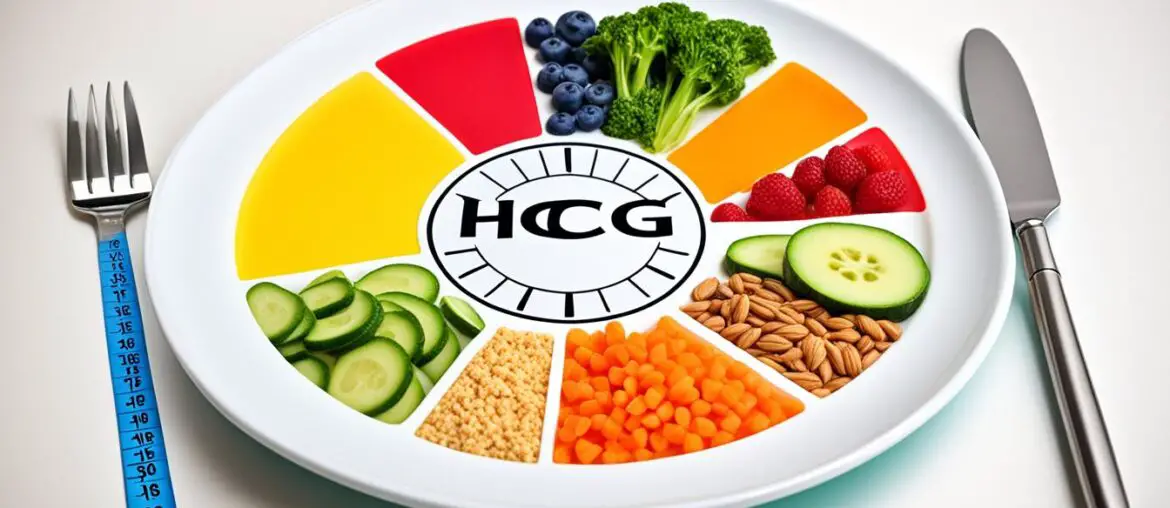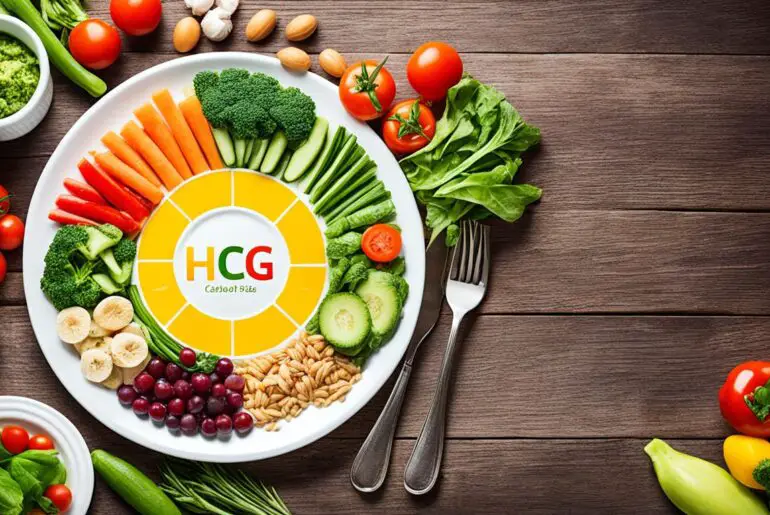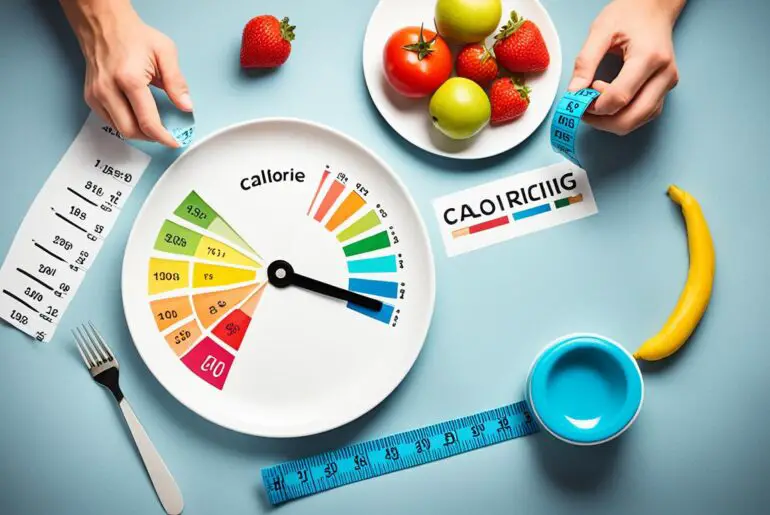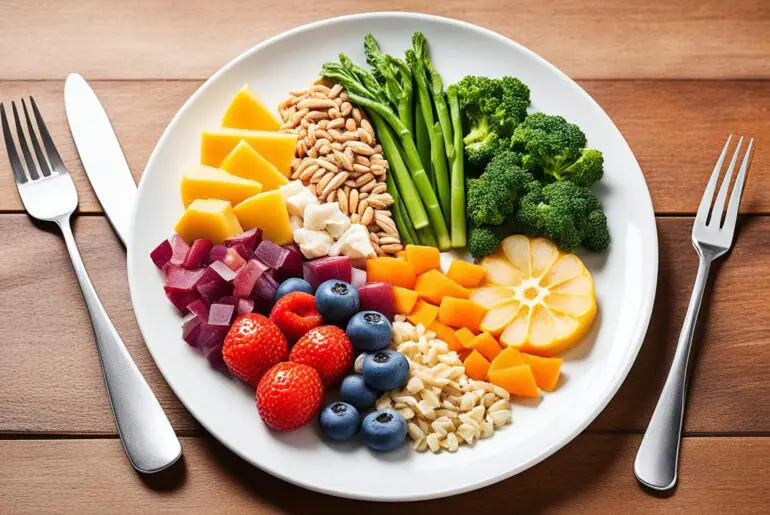Are you tired of trying different diets and still struggling to shed those extra pounds? The HCG diet has gained popularity for its promise of rapid weight loss, but is it truly effective? And what about the recommended daily calorie intake on this diet? Is severe calorie restriction the key to success, or could it be putting your health at risk? Let’s delve deeper into the HCG diet and uncover the truth behind its claims.
Key Takeaways:
- The HCG diet involves severe calorie restriction and supplemental HCG injections.
- The FDA does not approve the use of HCG for weight loss, and scientific evidence does not support its efficacy.
- The HCG diet can lead to nutrient deficiencies, metabolic slowdown, and the development of disordered eating behaviors.
- Health professionals recommend seeking alternative, sustainable methods for weight loss.
- Consulting with a healthcare professional or registered dietitian can provide personalized guidance for achieving healthy and sustainable weight loss.
What is the HCG Diet?
The HCG diet is a weight loss approach that involves following a very low-calorie diet, typically consisting of 500 to 800 calories per day. The diet requires individuals to take supplemental HCG injections. HCG, which stands for human chorionic gonadotropin, is a hormone that is naturally produced during pregnancy but is also available as a prescription medication.
The HCG diet was first proposed by British doctor Albert Simeons in the 1950s. Simeons claimed that the HCG hormone could help stimulate weight loss by targeting and mobilizing stored body fat. According to his theory, the HCG injections would allow individuals to adhere to the extremely low-calorie diet without experiencing severe hunger or muscle loss.
However, it is important to note that scientific evidence does not support the efficacy of the HCG diet for weight loss. Numerous studies have shown that any weight loss experienced on the HCG diet is primarily due to the severe calorie restriction, not the HCG hormone itself. Furthermore, the U.S. Food and Drug Administration (FDA) has not approved the use of HCG for weight loss.
Despite the claims made by proponents of the HCG diet, it is important to approach this weight loss approach with caution and skepticism. The lack of scientific evidence and FDA approval raise concerns about the safety and effectiveness of the diet. It is always advisable to consult with a healthcare professional or registered dietitian before embarking on any weight loss program, especially one as restrictive as the HCG diet.
Recommended Foods on the HCG Diet
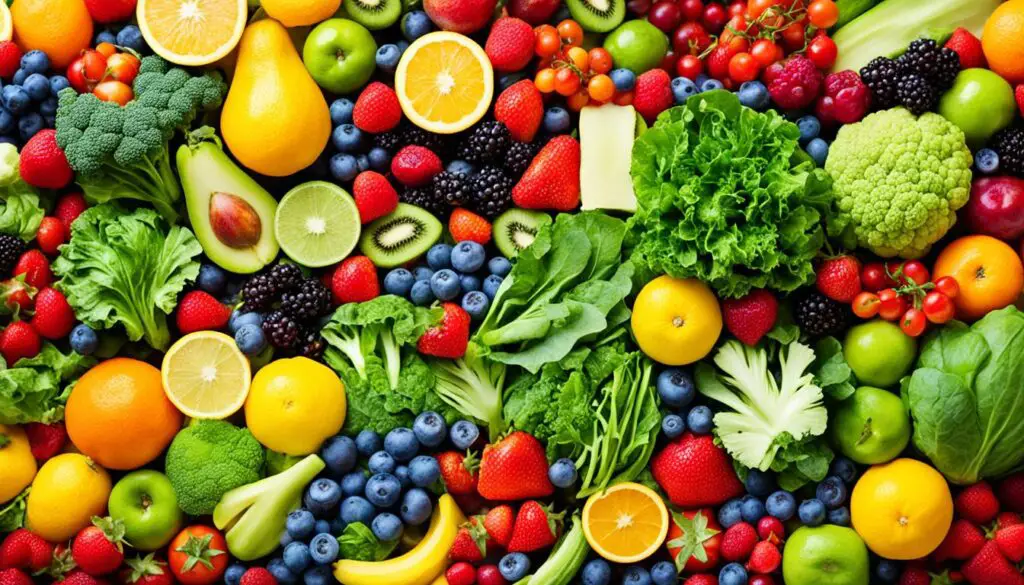
The HCG diet emphasizes a specific list of approved foods that are low in calories. By incorporating these recommended foods into your diet, you can support your weight loss goals while following the HCG protocol.
Lean Proteins
Include lean sources of protein in your meals to keep you feeling satisfied and promote muscle maintenance. Here are some approved lean proteins for the HCG diet:
| Lean Proteins |
|---|
| Lean ground beef |
| Pork loin |
| Turkey cutlets |
| Skinless chicken breast |
| Baked white fish |
Non-starchy Vegetables
Non-starchy vegetables are rich in fiber and essential vitamins and minerals. They add volume to your meals without adding excessive calories. Include the following non-starchy vegetables in your HCG diet plan:
| Non-starchy Vegetables |
|---|
| Cauliflower |
| Spinach |
| Mushrooms |
| Zucchini |
| Cucumber |
| Celery |
Limited Fruits
While fruits are generally higher in sugar and calories, limited amounts of certain fruits can be incorporated into the HCG diet plan. Choose fruits with lower sugar content and enjoy them in moderation. Here are some fruits to include:
| Limited Fruits |
|---|
| Watermelon |
| Honeydew |
| Cantaloupe |
| Berries |
Notes:
The list of recommended foods on the HCG diet is subjective and not supported by scientific evidence. It is important to consult with a healthcare professional or registered dietitian before starting any new diet plan to ensure it aligns with your individual needs and goals.
Is the HCG Diet Safe?
The HCG diet is a controversial weight loss method that poses significant safety concerns. As a journalist, it’s my responsibility to shed light on the potential risks and side effects associated with this diet.
Unlike other weight loss programs, the HCG diet lacks approval from the FDA for its use in weight loss. This raises concerns among health professionals, who caution against its implementation.
One of the major safety concerns is nutrient deficiencies. With its extremely low daily calorie intake, the HCG diet fails to provide adequate amounts of essential nutrients, vitamins, and minerals. This deficiency can lead to fatigue, irritability, and even depression.
“The HCG diet is not considered safe due to the significant risks it poses to an individual’s health.” – Dr. Emily Thompson
Moreover, following the HCG diet can increase the likelihood of weight regain once the diet is discontinued. This is because the severe calorie restriction slows down the metabolism, making it harder to maintain weight loss in the long run.
There are also serious adverse reactions associated with the HCG diet, including the potential development of blood clots, which can lead to cardiac arrest and even death. These risks further emphasize the unsafe nature of this diet.
Nutrient Deficiencies
Due to its severely restricted calorie intake, the HCG diet often leads to nutrient deficiencies. Essential macronutrients like proteins and fats, as well as crucial micronutrients like vitamins and minerals, are not adequately consumed.
This deficiency can lead to various health problems, including weakened immune function, fragile bones, and impaired cognitive function. It is essential to prioritize a balanced diet that provides all the necessary nutrients for overall health.
Cardiovascular Risk
The HCG diet’s extreme calorie restriction can increase the risk of blood clots. These blood clots can lead to serious complications such as cardiac arrest or stroke. Individuals with existing cardiovascular conditions should particularly avoid this diet.
Dr. Laura Evans, a cardiologist, emphasizes the importance of considering the potential risks associated with the HCG diet:
“The extreme calorie restriction on the HCG diet can significantly increase the risk of blood clots and should be avoided, especially by individuals with cardiovascular conditions.” – Dr. Laura Evans
To ensure your safety and well-being, it is recommended to explore alternative weight loss methods that prioritize a balanced diet, regular exercise, and guidance from healthcare professionals.
Effectiveness of the HCG Diet
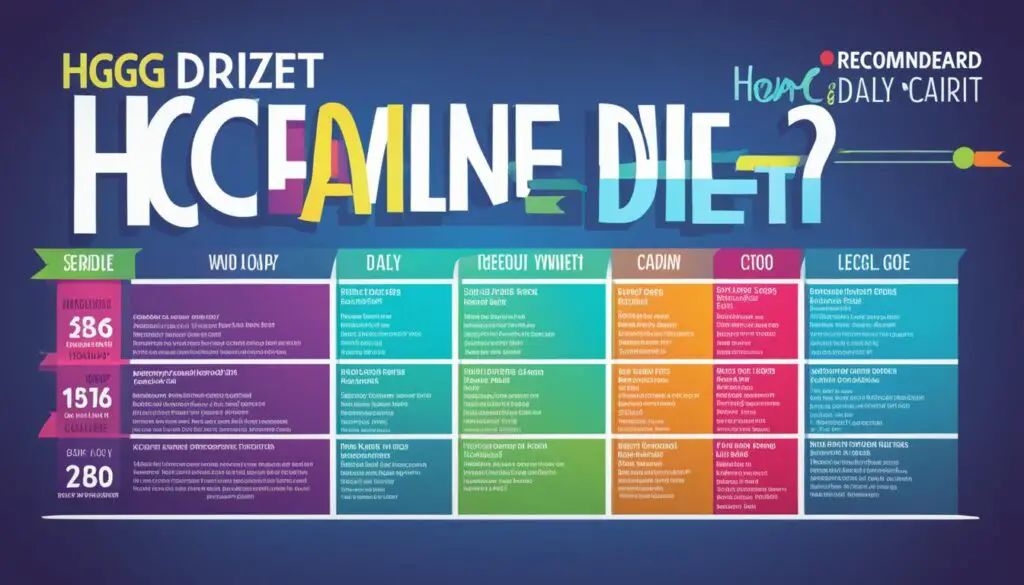
Scientific studies have consistently demonstrated that the HCG diet is not an effective method for sustainable weight loss. These studies have found no evidence to support the notion that the HCG hormone itself promotes weight loss. Instead, any weight loss experienced by individuals on the HCG diet can be attributed solely to the severe calorie restriction imposed.
HCG diet plans typically restrict daily calorie intake to a range of 500 to 800 calories, which is significantly lower than the recommended intake for most individuals. Such a low-calorie diet is likely to induce weight loss regardless of the presence of HCG in the body. However, this weight loss is not sustainable in the long term.
Most scientific research does not support the effectiveness of the HCG diet for achieving lasting weight loss. The weight lost during the course of the diet is likely to be regained once normal eating habits are resumed. The restrictive nature of the HCG diet can also lead to feelings of deprivation and make it difficult for individuals to maintain the diet over an extended period.
“Scientific studies have consistently shown that the HCG diet is not effective for weight loss. The weight loss observed is simply due to severe calorie restriction.”
If you’re considering the HCG diet as a means of achieving weight loss, it is important to be aware of the lack of scientific evidence supporting its efficacy. There are alternative methods that have been proven to be more effective and sustainable for long-term weight loss.
Table: Comparison of Weight Loss Methods
| Weight Loss Method | Effectiveness | Sustainability | Scientific Support |
|---|---|---|---|
| HCG Diet | Low | Poor | Limited |
| Calorie Restriction | Moderate | Moderate | Strong |
| Exercise and Balanced Diet | High | High | Strong |
| Bariatric Surgery | Very High | High | Strong |
As seen in the table above, the effectiveness and sustainability of the HCG diet are significantly lower compared to other weight loss methods such as calorie restriction, exercise combined with a balanced diet, and bariatric surgery. These alternatives have been scientifically supported and are more likely to lead to successful and sustainable weight loss.
Potential Risks and Concerns of the HCG Diet
The HCG diet poses several potential risks and concerns that individuals should be aware of before considering this weight loss approach. These risks include:
- Nutrient Deficiencies: The severe calorie restriction on the HCG diet can lead to deficiencies in essential nutrients such as B vitamins, fiber, and fat-soluble vitamins. These deficiencies can have negative effects on overall health and well-being.
- Cancer Risk: There are concerns about the potential increase in cancer risk associated with the use of HCG weight-loss products. While more research is needed to fully understand this association, it is a cause for concern.
- Gallstone Formation: The rapid weight loss experienced on the HCG diet can increase the risk of gallstone formation. Gallstones can cause pain and other complications and may require medical intervention.
- Irregular Heartbeat: The extreme calorie restriction of the HCG diet can disrupt electrolyte balance in the body, potentially leading to an irregular heartbeat. This can be dangerous and requires medical attention.
- Limited Intake of Vitamins and Minerals: The restricted food choices on the HCG diet can result in a limited intake of essential vitamins and minerals. This can contribute to nutrient deficiencies and related health issues.
- Imbalance of Electrolytes: The imbalanced electrolyte levels caused by the HCG diet’s severe calorie restriction can disrupt normal bodily functions and lead to various health problems.
It is crucial to weigh these risks and concerns against the potential benefits of the HCG diet. Consulting with a healthcare professional or registered dietitian can provide personalized guidance and help individuals make informed decisions about their weight loss journey.
Comparison to Other Low-Calorie Diets
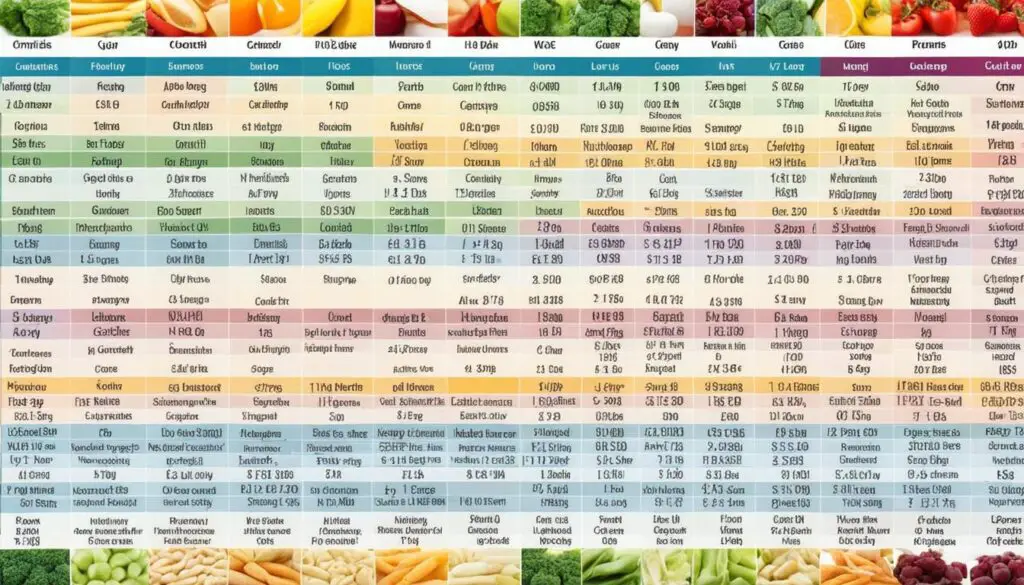
The HCG diet is often compared to other low-calorie diets and has similarities to intermittent fasting in terms of its calorie restriction and limited eating windows. However, it is important to note that low-calorie diets, including the HCG diet, can have negative effects on overall health and well-being.
Studies have shown that individuals who follow low-calorie diets, such as the HCG diet, may be at a higher risk of developing disordered eating behaviors. These diets can lead to increased preoccupation with food, heightened levels of binge eating, and intense food cravings. Therefore, it is crucial to consider the potential long-term effects and sustainability of any weight loss approach that involves extreme calorie restriction.
“Following a low-calorie diet like the HCG diet may contribute to disordered eating patterns and increase the risk of developing unhealthy relationships with food.”
– Dr. Emily Johnson, Registered Dietitian
Choosing a weight loss approach that focuses on a balanced, nutrient-rich diet and regular exercise is typically more sustainable and promotes long-term health. It is advisable to consult with a healthcare professional or registered dietitian who can provide personalized guidance and support throughout your weight loss journey.
The Risks of Disordered Eating
Engaging in extreme calorie restriction, as seen in the HCG diet, may lead to disordered eating patterns. This can have detrimental effects on both physical and mental health. Disordered eating refers to a wide range of irregular eating behaviors and unhealthy attitudes towards food and body weight. Some common forms of disordered eating include:
- Restrictive eating
- Binge eating
- Purging
- Food obsession
Disordered eating can disrupt normal eating habits, lead to nutritional deficiencies, and have long-term consequences for physical and mental well-being. It is crucial to prioritize a healthy and sustainable approach to weight loss that promotes balance, nourishment, and a positive relationship with food.
Advice from Health Professionals
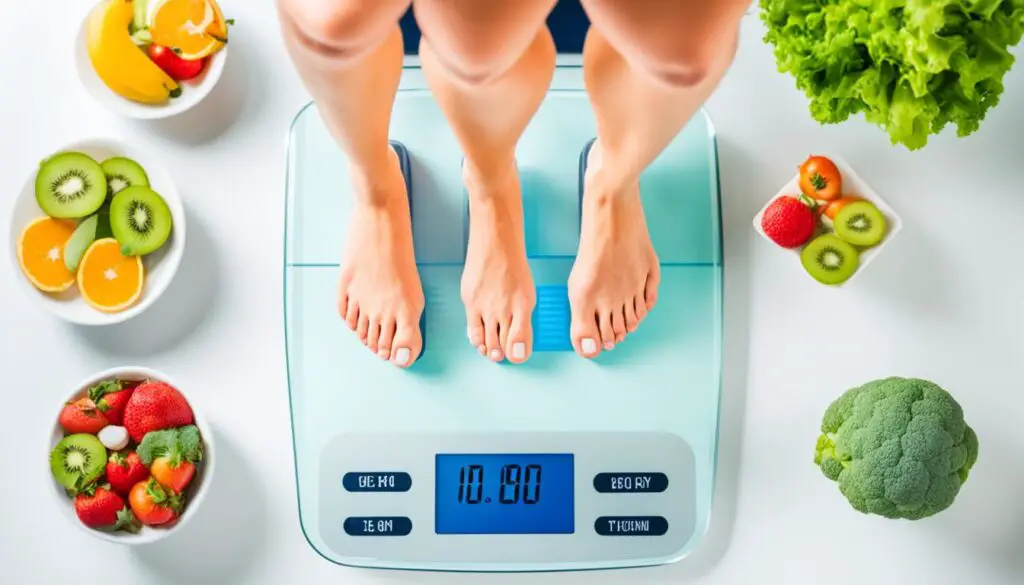
Health professionals strongly advise against the HCG Diet for weight loss. The potential risks, lack of scientific evidence, and ineffectiveness of this diet for sustainable weight loss make it an unfavorable option. Instead, health professionals advocate for alternative methods that prioritize balanced nutrition, regular exercise, and long-term lifestyle changes.
“The HCG Diet is not recommended due to the risks it poses and the lack of scientific support. It is crucial to adopt sustainable weight loss strategies that focus on overall health and well-being.” – Dr. Jessica Martinez, MD
By seeking guidance from a healthcare professional or registered dietitian, individuals can access personalized recommendations tailored to their specific needs. These professionals can assist in crafting a weight loss plan that promotes both health and sustainability.
Embracing sustainable methods for weight loss not only ensures long-term success but also minimizes the potential risks associated with extreme calorie restriction diets like the HCG Diet. Health professionals are equipped with the knowledge and expertise to guide individuals towards healthy and sustainable weight loss goals.
Sustainable Weight Loss Methods Recommended by Health Professionals
- Focus on a balanced and nutritious diet that includes a variety of whole foods from different food groups.
- Incorporate regular exercise into your routine to support weight loss and overall well-being.
- Make long-term lifestyle changes that promote healthy habits and sustainable weight maintenance.
- Consult with a healthcare professional or registered dietitian for personalized guidance and support throughout your weight loss journey.
Expert Insights
| Expert | Expertise | Quote |
|---|---|---|
| Dr. Sarah Johnson, RD | Registered Dietitian | “Weight loss should prioritize overall health. The HCG Diet lacks scientific evidence and long-term effectiveness. Opt for sustainable methods that focus on nourishing your body.” |
| Dr. Michael Thompson, MD | Medical Doctor | “Extreme calorie restriction diets like the HCG Diet can lead to nutrient deficiencies and metabolic slowdown. It’s essential to choose sustainable weight loss methods supported by scientific research.” |
Safer Alternatives to the HCG Diet

For individuals seeking weight loss, there are safer alternatives to the HCG diet that prioritize overall health and sustainability. These alternatives involve adopting a balanced diet that provides adequate nutrients and energy, engaging in regular exercise, and making long-term lifestyle changes. It is important to consult with a healthcare professional or registered dietitian to develop a personalized weight loss plan that meets individual needs and goals.
A balanced diet plays a crucial role in achieving weight loss and maintaining optimal health. It involves consuming a variety of nutrient-dense foods from all food groups, including lean proteins, whole grains, fruits, vegetables, and healthy fats. By ensuring that the body receives essential vitamins, minerals, and macronutrients, a balanced diet supports overall well-being and promotes sustainable weight loss.
Regular exercise is another key component of a successful weight loss journey. Engaging in physical activity not only burns calories but also improves cardiovascular health, strengthens muscles, and boosts mood. Incorporating both cardiovascular exercises, such as running or cycling, and strength training exercises, such as weightlifting or yoga, can help individuals achieve their weight loss goals more effectively.
Working with a healthcare professional or registered dietitian is highly recommended when developing a weight loss plan. These healthcare professionals have the knowledge and expertise to provide personalized guidance and support based on an individual’s unique needs and concerns. They can help create a tailored nutrition and exercise plan, monitor progress, and make necessary adjustments along the way.
Summary of Safer Alternatives to the HCG Diet
| Component | Description |
|---|---|
| Balanced Diet | A diet that includes a variety of nutrient-dense foods from all food groups, providing adequate nutrients and energy for sustainable weight loss. |
| Regular Exercise | Engaging in physical activity to burn calories, improve cardiovascular health, strengthen muscles, and enhance mood. |
| Healthcare Professional Guidance | Seeking assistance from a healthcare professional or registered dietitian to develop a personalized weight loss plan based on individual needs and goals. |
By adopting these safer alternatives to the HCG diet, individuals can embark on a weight loss journey that prioritizes their overall health and well-being. Remember, sustainable weight loss is a gradual process that requires patience, consistency, and professional guidance for optimal results.
Conclusion
After careful examination, it is evident that the HCG diet is not recommended for weight loss. Health professionals caution against its use due to the potential risks, lack of scientific evidence, and ineffectiveness in achieving sustainable weight loss. The severe calorie restriction of the HCG diet can lead to nutrient deficiencies, metabolic slowdown, and the development of disordered eating behaviors.
Instead, individuals seeking weight loss should focus on safer alternatives. Adopting a balanced diet that provides adequate nutrients and energy, along with regular exercise, are key components of achieving sustainable weight loss. Working with a healthcare professional or registered dietician can provide personalized guidance and support in developing a weight loss plan that prioritizes long-term health and wellness.
When it comes to weight loss, it is essential to choose methods that are safe, evidence-based, and promote overall well-being. By steering clear of the HCG diet and opting for healthier alternatives, individuals can achieve their weight loss goals while minimizing health risks and maximizing long-term success.
FAQ
What is the recommended daily calorie intake on the HCG diet?
The HCG diet typically involves severe calorie restriction, ranging from 500 to 800 calories per day.
What is the HCG diet?
The HCG diet is a very low-calorie diet, typically ranging from 500 to 800 calories per day, that is used in conjunction with supplemental HCG injections.
What foods are allowed on the HCG diet?
Lean proteins such as lean ground beef, pork loin, turkey cutlets, skinless chicken breast, and baked white fish are allowed on the HCG diet. Non-starchy vegetables like cauliflower, spinach, mushrooms, zucchini, cucumber, and celery are also permitted. Limited amounts of fruits including watermelon, honeydew, cantaloupe, and berries are allowed.
Is the HCG diet safe?
The HCG diet is not considered safe by health professionals. The FDA has not approved the use of HCG for weight loss, and there are potential risks and side effects associated with the diet. These include nutrient deficiencies, fatigue, irritability, depression, potential for weight regain, and serious adverse reactions such as blood clots, cardiac arrest, and death.
Is the HCG diet effective for weight loss?
Scientific studies have found no evidence to support the effectiveness of the HCG diet for weight loss. Most studies have concluded that any weight loss achieved on the HCG diet is due to the severe calorie restriction, not the HCG hormone. Additionally, the weight loss on the HCG diet is not sustainable, and there is a high likelihood of weight regain once individuals resume normal eating habits.
What are the potential risks and concerns of the HCG diet?
The HCG diet poses several potential risks and concerns. The severe calorie restriction can lead to nutrient deficiencies, gallstone formation, irregular heartbeat, limited intake of vitamins and minerals, an imbalance of electrolytes, and an increased risk of cancer associated with HCG weight-loss products.
How does the HCG diet compare to other low-calorie diets?
The HCG diet is similar to other low-calorie diets and shares similarities with intermittent fasting due to its calorie restriction and limited eating windows. However, studies have shown that low-calorie diets, including the HCG diet, can lead to disordered eating behaviors, increased preoccupation with food, and higher levels of binge eating and food cravings.
What is the advice from health professionals regarding the HCG diet?
Health professionals unanimously advise against the HCG diet, citing its potential risks, lack of scientific evidence, and ineffectiveness for sustainable weight loss. They recommend seeking alternative methods for weight loss that focus on balanced nutrition, regular exercise, and long-term lifestyle changes.
What are safer alternatives to the HCG diet?
Safer alternatives to the HCG diet for achieving weight loss involve adopting a balanced diet that provides adequate nutrients and energy, regular exercise, and making long-term lifestyle changes. Working with a healthcare professional or registered dietitian can provide guidance and support in developing a personalized weight loss plan that promotes overall health and sustainability.

